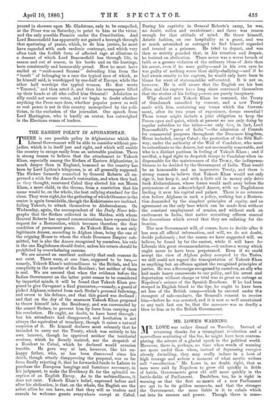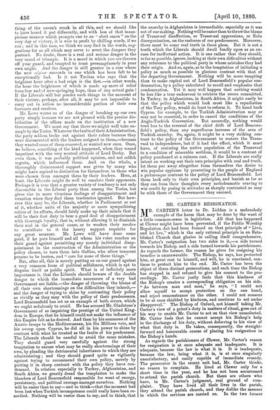R. LOWE'S WARNING.
MR. LOW/. was rather dismal on Tuesday. Instead of returning thanks for a triumphant re-election and a marvellous scattering of the foe, he might have been contem- plating the advent of a glacial epoch in the political world. However, there is, perhaps, no time when words of warning are more useful than when, instead of depressing energies already dwindling, they may really induce in a host of high courage and ardour a moment of what ascetic writers call "recollection." Mr. Lowe is, no doubt, right, that as men were said by Napoleon to grow old quickly in fields of battle, Governments grow old still more quickly in the battle-fields of Parliament. Doubtless, too, he is right in warning us that the first mcments of a new Parliament are apt to be its golden moments, and that the stronger the Government, the more liable is it to cabals which eat into its essence and power. Though there is some- thing of the raven's croak in all this, and we should like to have heard it put differently, and with less of that inaus- picious manner which prompts one to an " absit omen" on the very day of victory, it is wise to profit by chilling words, if we can ; and in this case, we think we may find in the words, sug- gestions for us all which may serve to avert the dangers they portend. No doubt, there is a real and serious danger in the very mood of triumph. It is a mood in which you are thrown off your guard, and tempted to .trust presumptuously in your own might. And the danger is still greater in a case where the new re'yinze succeeds to one which has been felt to be exceptionally bad. Is it not Tacitus who says that the brightest hour after a bad reign is the first,—in other words, the hour the brightness of which is made up more of relief from fear and of new-springing hope, than of any actual gain ? If the Liberals will but ponder such things in the moment of their victory, perhaps, after all, it may be not impossible to • carry out in action no inconsiderable portion of their own forecasts and resolves.
Mr. Lowe warns us of the danger of breaking up our own party simply because we are not pleased with the precise dis- tribution of the offices made on the institution of a new Government. We must say that there we might well take ex- ample by the Tories. Whatever the faults of their Administration, the party seldom broke out against their rulers because they were discontented with the leaders assigned to them,—because they wanted some of them removed, or wanted new ones. Once, we believe, something of the kind happened, when they waxed impatient with the very neutral attitude of Lord Derby. But even then, it was probably political opinion, and not selfish regrets, which influenced them. And on the whole, a thoroughly disinterested support was given by many who might have aspired to distinction for themselves, to those who were chosen from amongst them by their leaders. Here, at least, the Liberals might do well to emulate their opponents. Perhaps it is true that a greater variety of tendency is not only .discernible in the Liberal party than among the Tories, but .gives rise to more vivacious feelings of disappointment and vexation when they find these tendencies ignored. But how- ever this may be, the Liberals, whether in Parliament or out of it, whether units, of the majority or mere sympathising critics of its efforts, should fairly make up their minds that it will be their first duty to bear a good deal of disappointment with thorough loyalty, that is, without allowing it to diminish their zeal in the general cause, or to weaken their resolve to contribute to it the hearty support requisite for any great measure. Mr. Lowe will have done some good, if he puts himself and all whom his voice reaches on their guard against permitting any merely individual disap- pointment in the construction of the Administration or the policy chosen, to turn them into Gallios, who allow innocent persons to be beaten, and "care for none of these things." But, after all, this is merely putting us on our guard against .3 very common form of political selfishness, which is apt to disguise itself as public spirit. What is of infinitely more importance is, that the Liberals should beware of the double danger to which the immediate successors of a very bad Government are liable,—the danger of throwing the blame of all their own shortcomings on the difficulties they inherit,— and the danger of trying to shine by contrasting their policy as vividly as they may with the policy of their predecessors. Lord Beaconsfield has set us an example of both errors, which we ought sedulously to avoid. He has accused Mr. Gladstone's Government of so impairing the prestige of the United King- dom in Europe, that he himself could not make the influence of this Empire felt as he desired. And then by his summons of the Asiatic troops to the Mediterranean, his Six Millions vote, and his swoop upon Cyprus, he did all in his power to shine by contrast with what he treated as the faults of his predecessor. The Liberals should be careful to avoid the same mistakes. They should guard -very carefully against the strong temptation to excuse what may be really shortcomings of their own, by pleading the detrimental inheritance to which they are administering ; and they should guard quite as vigilantly against trying to recommend their own policy, merely by putting it in sharp contrast with the policy they have con- demned. In relation especially to Turkey, Afghanistan, and South Africa, we greatly dread the temptation to make the blunders of Lord Beaconsfield responsible for want of energy, persistency, and political courage amongst ourselves. Nothing will be easier than to say—and to think—that the moment had been lost when Turkish incompetence could really have been re- medied. Nothing will be easier than to say, and to think, that the anarchy in Afghanistan is irremediable, especially as it was not of our making. Nothing will be easier than to throw the blame of Transvaal disaffection, or Transvaal oppressions, or Zulu disorganisation, on the rashness of our predecessors. Moreover, there must be some real truth in these pleas. But it is not a truth which the Liberals should dwell fondly upon as an ex- cuse for ineffectual action. It is one rather that they should, so far as possible, ignore, looking at their own difficulties without any reference to the political party in whose mistakes they had their origin. And so, again, as to the temptation of initiating a policy as much as possible in glorious contrast with that of the departing Government. Nothing will be more tempting than to make capital out of Lord Beaconsfield's popular con- demnation, by a policy calculated to recall and emphasise that condemnation. Yet it may well happen that nothing would be less like a true endeavour to retrieve the errors committed. In Turkey, in Afghanistan, in South Africa, it might easily be that the policy which would look most like a repudiation of the Tory policy, would do least to reform it. To hand back Cyprus, for example, to the Turkish Administration may or may not be essential, in order to cancel the conditions of the Anglo-Turkish Convention. But assuredly, nothing would tend less to the reversal of the chief drift of Lord Beacons- field's policy, than any superfluous increase of the area of Turkish anarchy. So, again, it might be a very striking con- trast to the policy of the Government to restore the Trans- vaal to independence, but if it had the effect, which it must have, of restoring the native population of the Transvaal to a condition of miserable serfdom, it would be a contrast of policy purchased at a ruinous cost. If the Liberals are really intent on working out their own principles with zeal and truth, let them put away altogether from themselves the desire to win popular applause by presenting to the people of England a picturesque contrast to the policy of Lord Beaconsfield. Let them look only to their own principles, and banish as far as they can from their thoughts every melodramatic craving to win credit by posing in attitudes as sharply contrasted as may be with those of the Government they succeed.



































 Previous page
Previous page